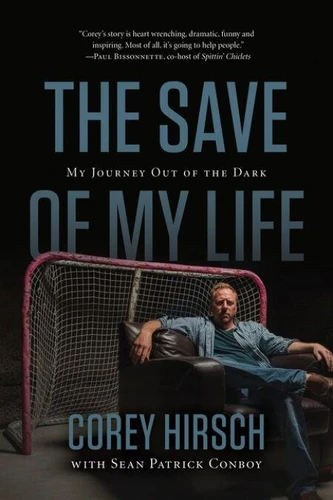The Save of My Life. My Journey Out of the Dark
Par : ,Formats :
Disponible dans votre compte client Decitre ou Furet du Nord dès validation de votre commande. Le format ePub protégé est :
- Compatible avec une lecture sur My Vivlio (smartphone, tablette, ordinateur)
- Compatible avec une lecture sur liseuses Vivlio
- Pour les liseuses autres que Vivlio, vous devez utiliser le logiciel Adobe Digital Edition. Non compatible avec la lecture sur les liseuses Kindle, Remarkable et Sony
- Non compatible avec un achat hors France métropolitaine
 , qui est-ce ?
, qui est-ce ?Notre partenaire de plateforme de lecture numérique où vous retrouverez l'ensemble de vos ebooks gratuitement
Pour en savoir plus sur nos ebooks, consultez notre aide en ligne ici
- Nombre de pages304
- FormatePub
- ISBN978-1-4434-6110-8
- EAN9781443461108
- Date de parution11/10/2022
- Protection num.Adobe DRM
- Infos supplémentairesepub
- ÉditeurCollins
Résumé
A riveting look behind the mask of an NHL goalie, The Save of My Life offers understanding and hope to anyone living with mental illnessBy the time he was twenty-two years old, goaltender Corey Hirsch had realized his childhood dream of playing in the NHL, won an Olympic medal and drunk from the Stanley Cup. While he excelled on the ice, out of the net Hirsch was plagued by persistent dark thoughts and ceaseless anxiety.
On days when he could barely get out of bed, he was able to push aside the endless loop of dark thoughts running inside his brain long enough to win a game. But as soon as he got back home, the agonizing cycle started all over again. And it continued, until finally he was able to confide in a team trainer who helped him get the professional treatment he needed. Diagnosed with obsessive-compulsive disorder, Hirsch was able to embark on the rocky road to recovery.
As one of the first professional athletes to talk openly about mental health, Hirsch wrote about his OCD for the Players' Tribune. His piece remains one of their most-read articles ever. As Hirsch says, "I am not insane. I am not a bad person. I am not weak. I have an illness, and there is a treatment."
On days when he could barely get out of bed, he was able to push aside the endless loop of dark thoughts running inside his brain long enough to win a game. But as soon as he got back home, the agonizing cycle started all over again. And it continued, until finally he was able to confide in a team trainer who helped him get the professional treatment he needed. Diagnosed with obsessive-compulsive disorder, Hirsch was able to embark on the rocky road to recovery.
As one of the first professional athletes to talk openly about mental health, Hirsch wrote about his OCD for the Players' Tribune. His piece remains one of their most-read articles ever. As Hirsch says, "I am not insane. I am not a bad person. I am not weak. I have an illness, and there is a treatment."
A riveting look behind the mask of an NHL goalie, The Save of My Life offers understanding and hope to anyone living with mental illnessBy the time he was twenty-two years old, goaltender Corey Hirsch had realized his childhood dream of playing in the NHL, won an Olympic medal and drunk from the Stanley Cup. While he excelled on the ice, out of the net Hirsch was plagued by persistent dark thoughts and ceaseless anxiety.
On days when he could barely get out of bed, he was able to push aside the endless loop of dark thoughts running inside his brain long enough to win a game. But as soon as he got back home, the agonizing cycle started all over again. And it continued, until finally he was able to confide in a team trainer who helped him get the professional treatment he needed. Diagnosed with obsessive-compulsive disorder, Hirsch was able to embark on the rocky road to recovery.
As one of the first professional athletes to talk openly about mental health, Hirsch wrote about his OCD for the Players' Tribune. His piece remains one of their most-read articles ever. As Hirsch says, "I am not insane. I am not a bad person. I am not weak. I have an illness, and there is a treatment."
On days when he could barely get out of bed, he was able to push aside the endless loop of dark thoughts running inside his brain long enough to win a game. But as soon as he got back home, the agonizing cycle started all over again. And it continued, until finally he was able to confide in a team trainer who helped him get the professional treatment he needed. Diagnosed with obsessive-compulsive disorder, Hirsch was able to embark on the rocky road to recovery.
As one of the first professional athletes to talk openly about mental health, Hirsch wrote about his OCD for the Players' Tribune. His piece remains one of their most-read articles ever. As Hirsch says, "I am not insane. I am not a bad person. I am not weak. I have an illness, and there is a treatment."



